Can GM recover from a year of 'great disappointment'?
- Published
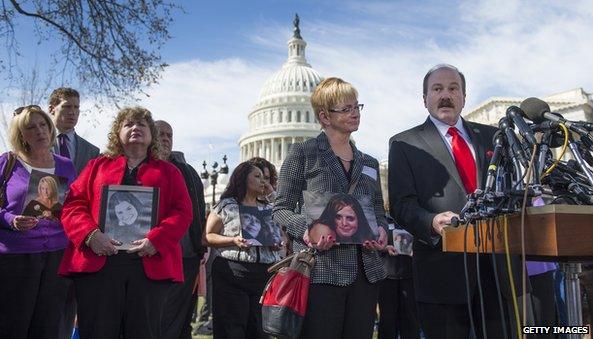
A defect with the ignition switch in some GM cars has been linked to 42 deaths
US car makers were forced to recall a record number of cars in 2014, as an ignition switch scandal at General Motors put a renewed focus on safety. Now, as all eyes turn to Detroit for the US car industry's annual extravaganza, the big question is: can the sector recover?
GM's boss Mary Barra put it bluntly to reporters this week: 2014 was, she admitted, "a year of great disappointment".
In the wake of revelations that GM had ignored a series of fatal accidents relating to problems with ignition switches in its vehicles, the car maker was forced to recall 2.6m cars in February 2014.
But as a series of mistakes by GM's engineers and managers, as well as by US safety regulators, were uncovered, that number quickly ballooned to nearly 30m cars by the end of 2014 as the company sought to proactively recall any cars that could possibly have defects. The total number of recalls ended up being significantly higher than the number of cars GM sold during the year.
"Certainly no-one expected [2014] to unfold the way it did - it was a tragedy," said Ms Barra, as the total number of deaths linked to the faulty ignition switches grew to 42 and the cost to GM ballooned to $400m (£256m), including a $35m fine from US regulators.
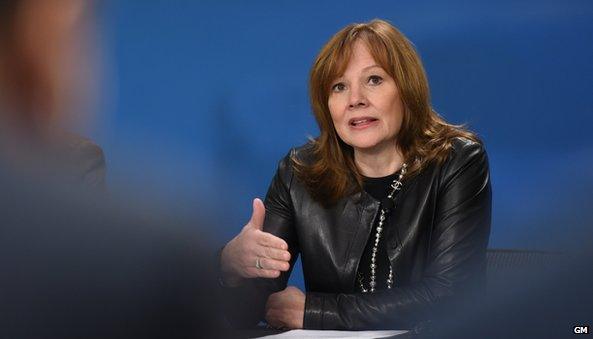
GM boss Mary Barra spoke to journalists ahead of the annual Detroit car show
But GM was not alone in suffering from safety woes in 2014. Airbag manufacturer Takata also found itself embroiled in a scandal in which shrapnel from its bags could escape, severely injuring passengers. Honda, BMW and others were all forced to issue recalls for cars containing the airbags.
So now, with nearly 60m cars in the US recalled - that's one out of every five cars on the road today - all eyes in Detroit are not just on the glitzy new launches, but on the lessons learned from previous safety issues.
Act fast
One of the major lessons learned from past recalls - particularly Toyota's in 2010, external - was that ignoring a safety issue is perhaps the worst strategy.
Analysts and observers credit Ms Barra for acting quickly and decisively once the full extent of GM's safety problems became clear.
Ms Barra said that the crisis made her "more impatient and more determined". "[In the past] I would have accepted longer timelines to accomplish something, but no more."
This approach seemed to set an example for other US car manufacturers throughout the year, as Ford and others also issued recalls.
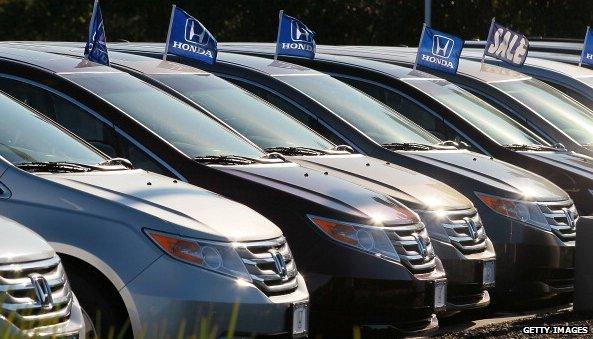
Honda recalled 4.8m of its cars that contained the faulty Takata airbags
"The GM scandal showed the industry that obviously you have to act fast, be forthcoming, don't just choose to ignore them," Jessica Caldwell, a car analyst at Edmunds.com, told the BBC.
"The reason why there are so many more recalls is auto makers are reacting quickly - sometimes the recalls are something that wouldn't necessarily be recalled," she adds.
There is some concern that the sheer number of recall announcements - there were more than 700 in 2014 - has made consumers somewhat immune to safety announcements. However, the greater emphasis on safety is largely seen as a positive one, particularly in how it relates to the culture at firms like GM.
Ms Barra has repeatedly emphasised that she has changed how executives are evaluated and compensated to make sure that GM engineers, managers and workers know that if they do not come forward once problems are identified, they will be held responsible.
Global industry
But not everyone has come away with that lesson.
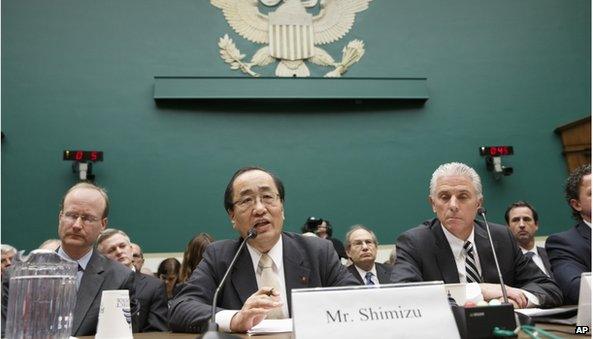
Takata executives have been forced to testify in front of Congress about the manufacturer's airbags
"An example of how not to handle a recall is the way that Takata has tried to handle - or not handle - its recall," says Bruce Belzowski, a professor at the University of Michigan.
The Japanese airbag manufacturer has resisted efforts by US regulators to issue a nationwide recall of cars that contain its airbags, which have been shown to explode in humid temperatures, potentially firing dangerous shrapnel at passengers.
That has forced piecemeal recalls by car manufacturers, such as Honda, who have used Takata's airbags.
What has become clear in the fight is the degree to which the car industry has become globalised, with various models manufactured by different firms across the globe containing similar parts.
There are only three airbag manufacturers in the world, for instance, meaning that many firms from Honda to BMW were all affected by Takata's troubles.
"This is a huge issue of global suppliers - if you supply multiple manufacturers with the same part throughout the world your exposure can be high or higher than that of a car manufacturer," adds Prof Belzowski.
Still buying
But in the end, although recalls are inconvenient for the customer and embarrassing for the manufacturer, GM's safety issues do not seem to have had a damaging impact on sales. In fact, in 2014 the company ended up having its best sales year since 2008, external.
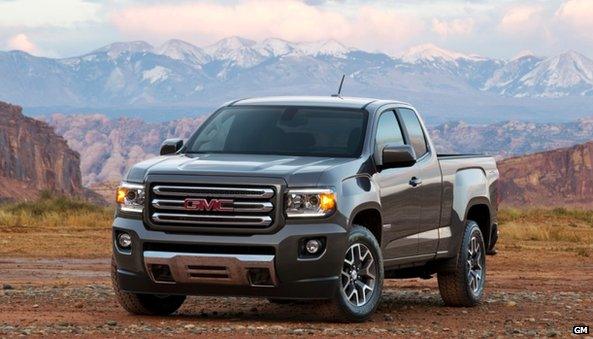
GM unveiled its Canyon pick-up truck last year in Detroit, which was well-received by consumers
Partially, that can be explained by factors unaffected by the surge in recalls: the current age of cars on US roads is the highest it has ever been, and with low interest rates set to expire, many drivers have another incentive to purchase a new car this year.
And then, of course, there's the matter of what they're actually buying.
"GM has been putting out really great product[s] this year - they had the right product at the right time," says Akshay Anand, an analyst with Kelly Blue Book (KBB), which gathers data about US car buying habits.
And that is the message that Ms Barra and GM are hoping to continue to emphasise this January in Detroit, as the car maker unveils a slew of new products, from trucks to a new Volt.
And every cloud has a silver lining. Ms Barra thinks GM has come out stronger.
"As difficult as last year was - it was tragic - but the team came together."